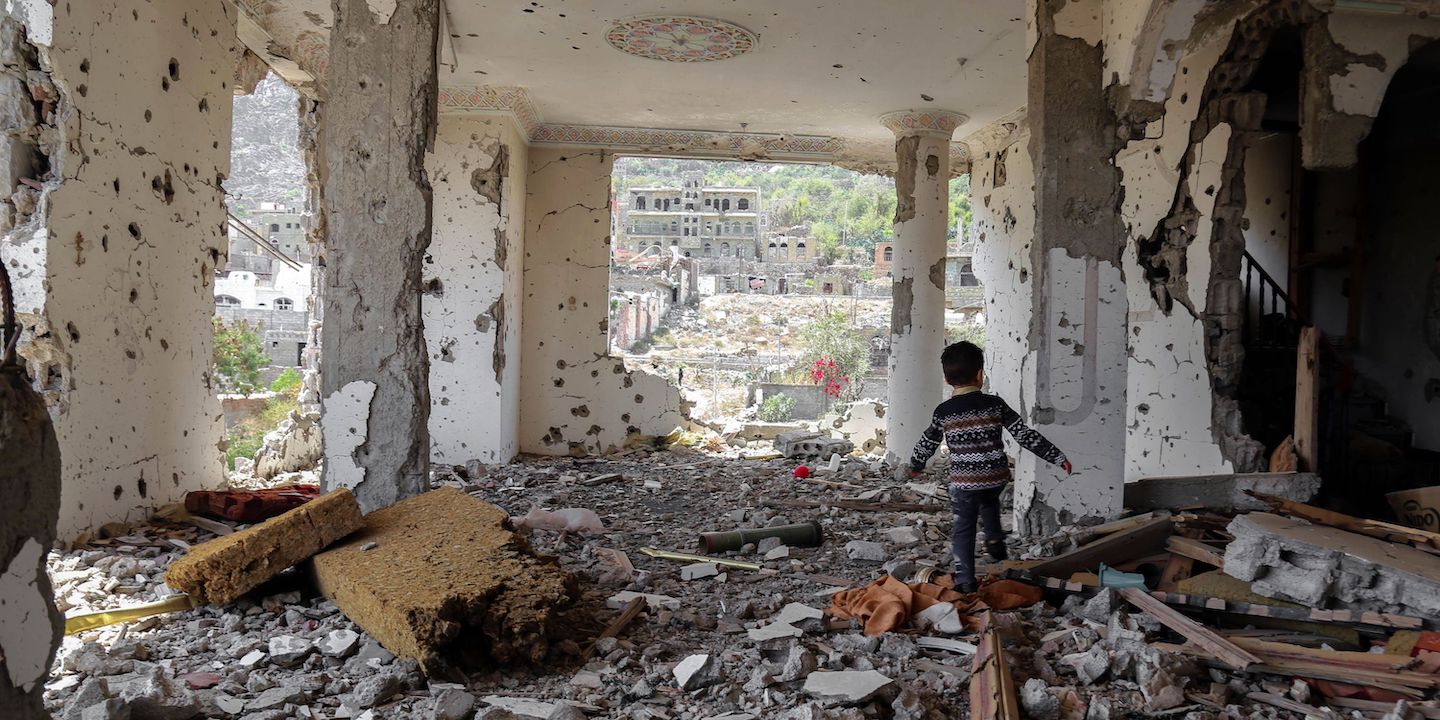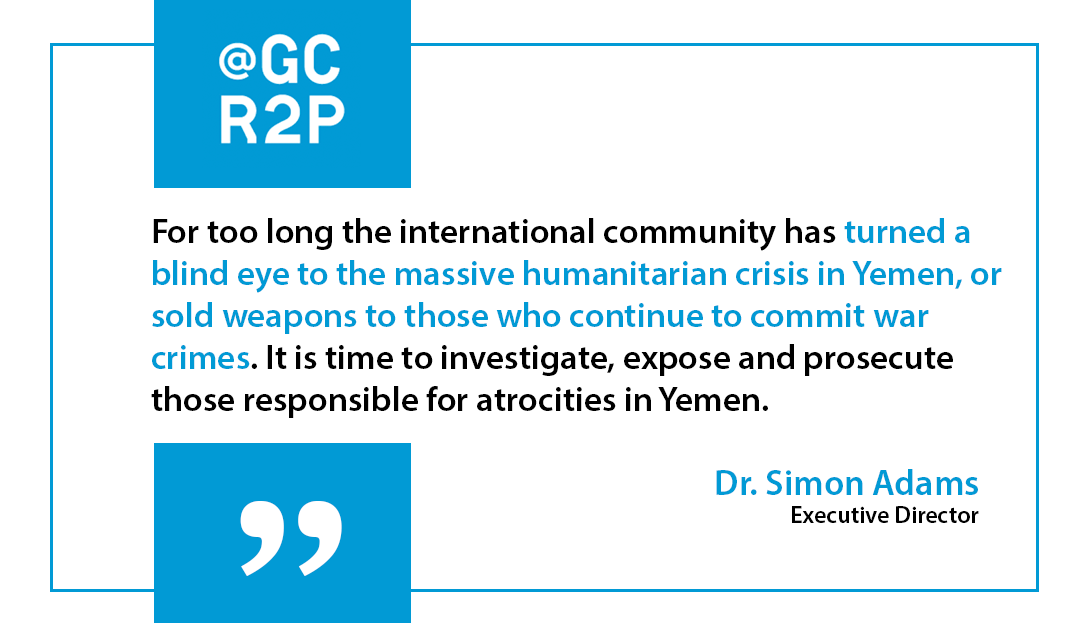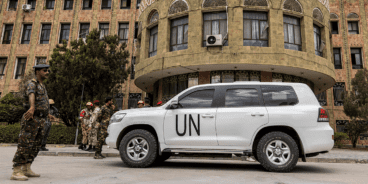

U.N. Human Rights Council: Help Bridge Yemen’s “Acute Accountability Gap”
States should help pave the way towards credible accountability and redress for the people of Yemen by renewing and strengthening international investigations into war crimes, other serious violations of international humanitarian law, and grave human rights abuses during this 45th Session of the UN Human Rights Council (the Council), 24 organizations said today.
Yemen is suffering from an “acute accountability gap,” according to the UN Group of Eminent Experts (GEE) on Yemen, which released its third report on September 9, 2020. With COVID-19 threatening the lives and livelihoods of millions across Yemen, peace talks floundering, and airstrikes, shelling and attacks impacting civilians once again increasing, the reality for millions of Yemeni civilians is growing ever more bleak. This session, the Human Rights Council has the opportunity to pave the way towards credible accountability and redress for victims and survivors in Yemen.
People in Yemen have experienced grave abuses since the conflict began in 2014, when Ansar Allah (the Houthi armed group) and military units loyal to former president Ali Abdullah Saleh took control of the capital, Sana’a, and escalated in 2015 when the Saudi/UAE-led coalition militarily intervened on the side of the Yemeni government.
With the conflict in its sixth year, millions of Yemenis are without adequate food, water, shelter or healthcare. The parties to the conflict impede the flow of life-saving goods into and around the country, attack critical infrastructure, and misdirect goods and their revenues to their own coffers and loyalists. Thousands of civilians have been killed, wounded and otherwise harmed by airstrikes that violate international humanitarian law, indiscriminate shelling and the use of banned anti-personnel landmines. The societal fabric has torn, with expression, speech, peaceful protest and movement increasingly restricted, and political and other identity-based divisions weaponized by those in power.
The human rights and humanitarian catastrophe in Yemen is man-made, and was avoidable. The parties to the conflict continue to hold the vast majority of power in and over Yemen. For Yemen’s trajectory to change, the behavior of the parties to the conflict and their backers needs to change. As of September 2020, perpetrators have gone unpunished, states responsible for violations have faced no real consequences, parties have rarely acknowledged fault or taken measures to protect civilians, suppliers keep the arms used for international humanitarian law violations flowing, and victims have been denied justice and redress.
In 2017, the Council established the GEE to report on violations of international law in Yemen and, where possible, to identify those responsible. The Council renewed the GEE’s mandate in 2018 and 2019, despite opposition from the Saudi/UAE-led coalition.
In its third report, the UN experts found the international community “can and should” do more to “help bridge the acute accountability gap” in Yemen. The experts provided a list of specific recommendations, including for the Security Council to refer the situation in Yemen to the International Criminal Court and to expand the list of persons subject to Security Council sanctions. The GEE supported the establishment of an investigative body, similar to the International, Impartial and Independent Mechanism for Syria, and specifically called on the Council to ensure the situation of human rights in Yemen remains on its agenda, including by ensuring adequate resources are provided to the GEE for the collection, preservation and analysis of information related to violations and crimes. In the longer term, the Group encouraged “further dialogue about the creation of a special tribunal such as a ‘hybrid tribunal’ to prosecute cases of those most responsible,” reiterated the importance of victims’ right to a remedy, including reparations, and called for human rights to be “at the heart of any future peace negotiations,” including that “no steps are taken that would undermine respect for human rights and accountability, such as granting blanket amnesties.”
The GEE also reiterated concerns that states supplying arms to parties to the conflict, including to Saudi Arabia and the UAE, may be violating their obligations under the Arms Trade Treaty, and that this support may amount to aiding and assisting internationally wrongful acts.
Today, 24 Yemeni, regional and international civil society organizations came together to call on the Council to endorse the GEE’s report, including its findings on accountability, and to take concrete steps this Council session to pave the way towards credible justice for Yemen. The 24 organizations are calling on the Council to renew and strengthen the GEE’s mandate this September, including to collect, consolidate, preserve and analyze evidence related to, and clarify responsibility for, the most serious crimes under international law and violations of international law committed in Yemen since 2014. The organizations are also calling on the Council to task the GEE with issuing a special report advising states on practical steps they can take to help ensure justice and redress for the tens of thousands of Yemeni civilians unlawfully harmed by the warring parties throughout this conflict.
Organizational Quotes:
“More than half a decade into this catastrophic war, the international community should no longer ask Yemenis to wait for justice,” said Radhya al-Mutawakel, Chairperson, Mwatana for Human Rights. “Those who bomb buses full of children, sentence journalists to death, and steal humanitarian aid must be put on notice that they will be held accountable.”
“Real, concrete forms of accountability and redress are essential if we want to see an end to this nightmare,” said Jeremie Smith, Geneva Director of the Cairo Institute for Human Rights Studies. “The fate of millions hangs in the balance.”
“The international community should act immediately to end the man-made human rights and humanitarian catastrophe in Yemen. Apart from accountability and redress, states supplying arms to parties to the conflict should be held accountable,” said Murat Çelikkan, Co-Director of Hafıza Merkezi. “The hesitancy to bring justice to the Yemeni people undermines the international respectability of human rights and human rights and humanitarian law.”
“Widespread impunity by all sides means that human rights violations will continue to mount, and those who document these violations and defend human rights are at extremely high risk. Only accountability will pressure those committing the violations to stop,” said Khalid Ibrahim, Executive Director of the Gulf Centre for Human Rights (GCHR).

“For too long the international community has turned a blind eye to the massive humanitarian crisis in Yemen, or sold weapons to those who continue to commit war crimes and other violations of international law,” said Dr. Simon Adams, Executive Director of the Global Centre for the Responsibility to Protect. “It is time to investigate, expose and prosecute those responsible for atrocities in Yemen.”
“We call on the international community to put pressure on all parties to the conflict, including on Saudi Arabia and the UAE not to use the blockade as a means of collective punishment, and to hold accountable those responsible for the recruitment of children,” Sadek Al Saar, President, Salam For Yemen.
“We witness everyday a great number of atrocities in Yemen, without any acknowledgement of the need for accountability, and impunity feeding more of those atrocities,” said Akram Al-Shwafi, Director of Watch for Human Rights. “Bringing those who commit violations to justice and offering redress to victims is the only way to achieve peace and security.”
“The UN panel report lays out in horrific detail the immense toll Yemen’s conflict has taken on civilians. States should take a stand on behalf of victims and urgently pursue the panel’s strong accountability recommendations,” said Balkees Jarrah, Associate International Justice Director, Human Rights Watch.
“This is an extremely damning report and underlines the complicity of arms-dealing governments. All parties to the war have shown a total contempt for international law and the rights and lives of people in Yemen. After five terrible years, this war has killed tens of thousands of people and destroyed vital infrastructure across Yemen. The war must stop, and so must the arms sales that have enabled it.” Andrew Smith, Media Coordinator, Campaign Against Arms Trade.
“Warring parties have perpetrated abuses with near total impunity in Yemen,” said Michael Payne, Interim Advocacy Director, Physicians for Human Rights. “The parties to the conflict have routinely violated international humanitarian law and have decimated Yemen’s health system, inflicting widespread death and suffering on civilians. The international community must do more to hold the warring parties to account.”
“The experiences we went through have proved to us that without justice and accountability, any peace deal will surely fail, and that accountability and justice for the victims and holding those who commit violations accountable are real guarantees for a lasting peace,” said Amat Al-Salam Abdullah Al-Haj, Director, the Mothers of Abductees Association.
“The international community’s commitment to date has ensured that the grave violations and abuses that are still happening on a daily basis in Yemen are being duly investigated and reported on –the HRC must take this commitment to the next stage, for victims have the right to the truth and they have the right to justice and to redress,” said Lynn Maalouf, Middle East Director, Amnesty International.
Signatories:
- Action by Christians Against Torture (ACAT-France)
- Amnesty International
- Andalus Institute for Tolerance and anti-Violence Studies
- Bosnian-Herzegovinian Pride March, Bosnia and Herzegovina
- Cairo Institute for Human Rights Studies
- Campaign Against Arms Trade
- Center for Social Impact Studies, Ghana
- Dhameer Organization for Rights and Freedoms
- Global Centre for the Responsibility to Protect
- Gulf Centre for Human Rights (GCHR)
- Hafıza Merkezi, Turkey
- Human Rights Watch
- International Commission of Jurists (ICJ)
- International Federation For Human Rights (FIDH)
- Justice Call for Rights and Development
- Mothers of Abductees Association
- Musaala for Human Rights
- Mwatana for Human Rights
- PAX (the Netherlands)
- Physicians for Human Rights
- Salam For Yemen
- Sisters’ Arab Forum for Human Rights (SAF)
- Watch for Human Rights
- Yemeni Civil Alliance for Peace
Related Content


